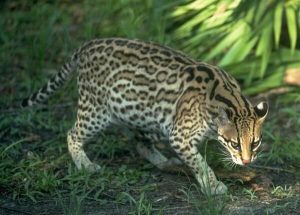A ocelote was run over on National Route No. 12, inside the Iguazú National Park in Misiones. The tragic incident occurred in a section with specific signage that requires reduced speed to protect the wildlife. Despite this, road recklessness claimed another victim.
The case was reported by the Yaguareté Network Foundation, which described it as a new episode of a constant problem on the roads in northern Misiones. “We demand greater control, effective sanctions, and concrete measures from national and provincial authorities to stop this situation because #RunningOverThemIsExtinction,” they posted on their social media.
Data from environmental organizations indicate that more than 5,000 wild animals die each year due to road accidents in Misiones, especially on Routes No. 12 and 101, which pass through areas of high ecological value. Despite the imposed speed limits, many drivers do not respect them.
This is not an isolated tragedy. In February, another ocelot died on the same route. In April, a puma and several coatis were also fatal victims of vehicular traffic in protected areas. The situation has raised alarm among environmentalists and scientists.

Urgent measures are requested to prevent road accidents
The Wildlife Foundation warned that the constant loss of fauna severely affects the ecological balance of the region. “Each species plays a key role in the Misiones ecosystem. These accidents generate a silent but devastating damage,” they pointed out.
Given the recurrence of these accidents, various environmental organizations demand the installation of fixed radars, speed reducers, and wildlife crossings, both elevated and underground. They also call for sustained road awareness campaigns aimed at tourists and local residents.

Conservation status of the ocelot in Argentina
The ocelot (Leopardus pardalis), also known as the margay, is a native species of America that is endangered in several areas of its distribution. In Argentina, its presence is mainly limited to the subtropical forests of the northeast, especially in Misiones.
Its population has drastically decreased due to habitat loss, illegal hunting, and more recently, road accidents in routes that cross protected areas. Currently, it is categorized as “vulnerable” in the country, and sightings in the wild are becoming increasingly rare.
The Iguazú National Park is one of the last safe havens for this species, although human pressure and uncontrolled tourism complicate its conservation. The recurrent death of specimens on the roads jeopardizes efforts to protect the ocelot and prevent its local extinction.
Environmental and road authorities play a key role in reversing this situation. Experts agree: without effective and urgent measures, the ocelot could disappear from Argentine territory in a few decades.

